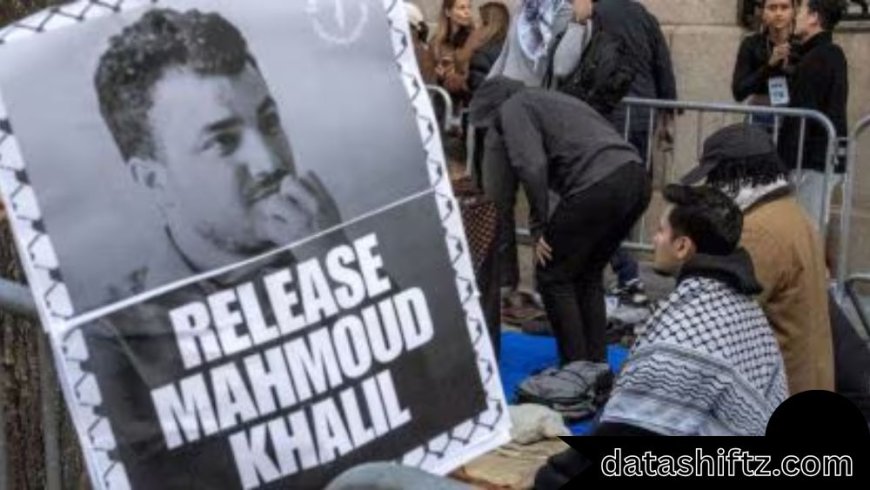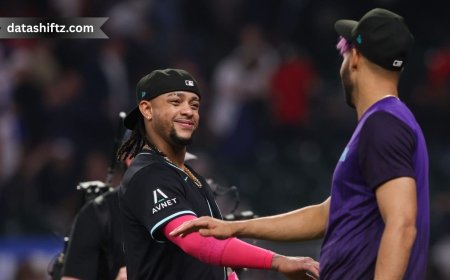Who Is Mahmoud Khalil? A Story of Activism, Rights, and Legal Battles

Mahmoud Khalil is a Palestinian‑born graduate student, activist, and legal permanent resident of the U.S. His recent detention and deportation attempt sparked nationwide debate around free speech, immigration law, and U.S. foreign policy. This blog explores his journey—from refugee beginnings to Columbia University activism—and the landmark legal decisions shaping his fate.
From Refugee to Columbia University Student
Mahmoud Khalil was born in 1995 in a Palestinian refugee camp in Damascus, Syria. He’s often described as a “double refugee”: Palestinian by heritage and forced into exile by the Syrian conflict At around age 18, he fled to Lebanon amid Syria’s civil war, learned English, and earned a computer science degree while working with refugee nonprofits
Later, he worked for the British embassy’s Syria office and interned at UNRWA in New York before enrolling at Columbia University’s School of International and Public Affairs (SIPA) in early 2023 At Columbia, he emerged as a spokesperson and negotiator during the 2024 pro‑Palestinian encampment protests
Snapshot of Khalil’s Life
| Aspect | Details |
|---|---|
| Birth Year | 1995, in a Syrian refugee camp |
| Citizenship | Algerian (through mother), holds U.S. green card |
| Education | Undergrad in Lebanon; MPA candidate at Columbia |
| Activism Role | Lead negotiator and spokesperson for CU protests |
| Family | Married to Noor Abdalla, a U.S. citizen; newborn son Deen |
Arrest, Detention, and Legal Battle
On March 8, 2025, Khalil was arrested by ICE in his Columbia apartment lobby. His green card was revoked under a little‑used immigration law that permits deportation of non‑citizens deemed harmful to U.S. foreign policy.
His detention triggered widespread protests and legal challenges, supported by organizations like the ACLU, NYCLU, CLEAR, and other civil‑rights advocates. Lawyers argued that he wasn’t accused of any crime, and that his detention was a violation of his First Amendment rights.
Landmark Court Decision
On June 11, 2025, Judge Michael Farbiarz of the U.S. District Court in Newark ruled that the Trump administration lacked valid grounds under foreign‑policy authority to detain or deport Khalil.
Key findings included:
-
Continued detention risked “irreparable harm” to his career, rights, and reputation.
-
The court blocked removal based on foreign‑policy claims but allowed consideration of alleged green‑card application omissions .
-
The order took effect pending appeal, with an eventual $1 bond release expected by Friday.
Eventually, the judge said Khalil was likely wrongfully detained due to his activism, not immigration paperwork issues.
Why This Case Matters
1. Free Speech Under Pressure
Khalil’s case is viewed as retaliation for his political expression—setting a precedent on how activism is treated under immigration law.
2. Foreign Policy as Grounds for Deportation
The administration's use of a rarely invoked statute raised concerns about executive overreach .
3. Precedent for Other Students
Khalil’s legal victory emboldens others, including Columbia’s Mohsen Mahdawi and Tufts student Rumeysa Ozturk—also detained after campus protests
4. Impact on Immigrant Rights
This case challenges the legality of detaining lawful permanent residents for protected speech, drawing attention from civil‑rights groups nationwide
Chronology of Key Events
-
1995 – Born in Syrian refugee camp.
-
2012 – Family flees to Lebanon amidst Syrian conflict.
-
2022 – Enters U.S. as a student; gains green card in 2023.
-
October 2023–2024 – Becomes activist during Gaza protests at Columbia.
-
March 8, 2025 – Arrested by ICE; detained in Louisiana.
-
April 2025 – Immigration judge rules deportation possible via Rubio’s foreign‑policy claim.
-
June 11, 2025 – Federal judge blocks deportation; bonds and release ordered.
-
Friday (June 13) – Potential release pending appeals and bond posting.
The Broader Implications
Immigration Law vs. Free Expression
If left unchecked, using foreign-policy statutes to deport activists could chill speech and grant the executive broad power over dissenting immigration statuses.
Campus Activism
With increasing student-led movements on controversial issues, similar actions may invite more aggressive immigration responses—raising constitutional concerns.
Legal Precedent
Federal courts are now positioned to limit executive detentions under foreign-policy justifications—strengthening protections for lawful residents.
What’s Next for Mahmoud Khalil?
-
Immediate Outcome: Pending appeal, he’ll post bond and likely return to New York to reunite with his family and continue advocacy
-
Ongoing Legal Challenges: Legal teams will continue fighting any administrative efforts to remove him via immigration courts .
-
Potential Supreme Court Role: This case could escalate, potentially defining the constitutional limits of foreign-policy-based deportations .
Final Takeaways: Why You Should Care
| Theme | Significance |
|---|---|
| Free Speech Rights | Challenges government power to deport activists. |
| Immigration Protections | Supports lawful immigrants against ideological targeting. |
| Campus Climate | Defends student political expression from punitive measures. |
| Legal Precedent | May limit executive overreach and protect civil liberties. |
Concluding Reflection
Mahmoud Khalil’s journey—from refugee camp to high‑stakes legal battle—is a poignant reminder of the fragile balance between activism and state power. His defense of Palestinian rights, and the subsequent government reaction, have ignited an important national conversation on free speech, immigrant protection, and the reach of executive authority. His partial legal victory marks a milestone—but the broader fight continues.
By following Khalil’s case, we gain insight into how democratic principles are tested and upheld in modern America—a testament to both the promise and complexity of activism in the 21st century.





























